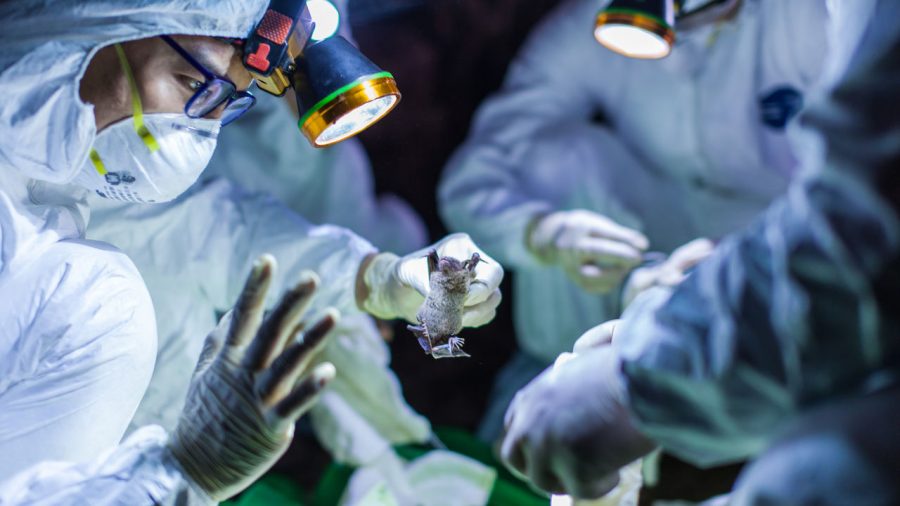Coronavirus Chaos
Source: Ecohealth Alliance for Science Magaizine
Researchers examine a bat from a cave in China to see if it carries coronavirus.
February 14, 2020
On December 31st, 2019, the Chinese government reported a growing number of cases of a pneumonia-like illness. By January 7, 2020, the authorities realized that they had a different disease on their hands; a new, incredibly infectious strain of coronavirus.
People often refer to the disease as the coronavirus, but it’s specifically called 2019-nCoV, or novel coronavirus. This is because coronavirus is the family the virus is part of, not the name of the strain. Symptoms of novel coronavirus include fever, headache, runny nose, and the general feeling that you are unwell. At first glance, nCoV doesn’t seem deadly, but the moderate to life-threatening pneumonia it can cause is what’s giving it its power.
One of the major concerns surrounding novel coronavirus is the rate at which it’s spreading. The World Health Organization (W.H.O.) has declared a global health crisis, and it’s not difficult to see why. More than 24,000 cases have been confirmed, and not just in China. Medical facilities have isolated patients in Sri Lanka, Korea, and, most recently, the U.S. Here, the coronavirus victims are mostly found in California. All patients are, luckily, in good condition. Because of our current status, no one is scared that the few infections will blossom into a full-blown outbreak. Although we may think we have nothing to fear, government bodies are making plans just in case the disease becomes even more widespread.
School districts have canceled student exchange programs to China and have asked that students who have visited the area not attend school. Australia has attempted to evacuate its citizens from China. A majority of countries have placed a flight ban on all planes in or out of China. Flight bans are a controversial defensive measure among the people, and some think that this course of action makes our country seem hostile.
On the other hand, many people have faith in the efficiency of the government’s tactics; seventh-grader Rachel Yoo suggests, “I don’t think there is going to be an outbreak in America because they are probably going to handle it well.”
Whether or not it’s bound to spread across America, it’s always best to know how to prevent a new disease. Since it’s so easily spread, we may need to take extra precautions. “Just try to cover your mouth when you sneeze or cough, wash your hands before you eat, stuff like that,” adds seventh-grader Maxwell Murase.
It’s true that, like the cold, novel coronavirus can only be prevented by hand washing, covering your mouth and staying away from infected people. Despite the common belief, flu masks are no match against novel coronavirus. Once the paper gets damp (from coughing or sneezing), the mask will no longer work.
Yes, there isn’t much of a risk of an outbreak in America. No, you don’t have much to fear. Still, be prepared; we will never truly know when nCoV will strike again.


Amy Le • Mar 25, 2020 at 11:31 am
this is a nice informational article
Ethan Lee • Mar 12, 2020 at 9:16 am
The virus infected two basketball players. This is very serious
Hala Essayli • Mar 6, 2020 at 1:44 pm
Great job Maleah writing this article! Way to go!
Caroline Kerns!! • Mar 6, 2020 at 1:41 pm
very informational maleah! an amazing story!
Elise • Mar 2, 2020 at 8:48 pm
Nice job on this article! I learned a lot of new facts about the virus and the real truth about it.
Santi M. • Mar 2, 2020 at 3:19 pm
This is very well written!
Ryan Morgan • Feb 27, 2020 at 7:57 pm
Great job on this article it told me a lot more about the virus that I had never heard about from TV/news
Afennessey • Feb 22, 2020 at 8:15 am
Great article. Since I work in the health care industry I need to stay informed at all times of such things. I learned a few things I didnt know prior that I can pass on to my fellow co-workers. Thank you.
Sydney Mastick • Feb 14, 2020 at 2:43 pm
I love your story. It gives a perspective that most didn’t have before. I now know more about the virus.
Ashley • Feb 14, 2020 at 2:39 pm
Your have written a really interesting article, Maleah, I know know a lot more about the virus!
Natalie Moumdjian • Feb 14, 2020 at 1:48 pm
Very informative and well written! I really enjoyed this and it opened my eyes to what this virus really is capable of.
ᗩᎥᒪᗩᑎᎥ • Feb 14, 2020 at 1:04 pm
kool